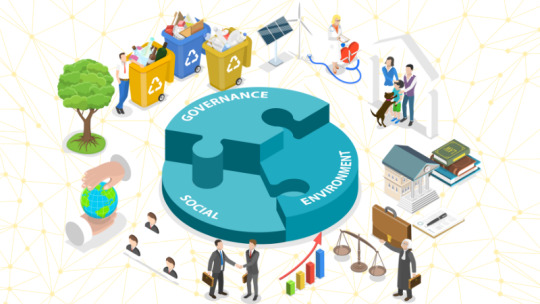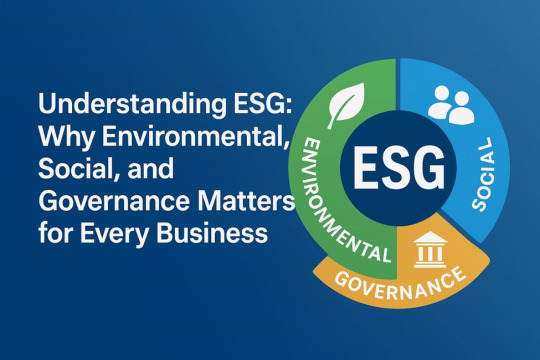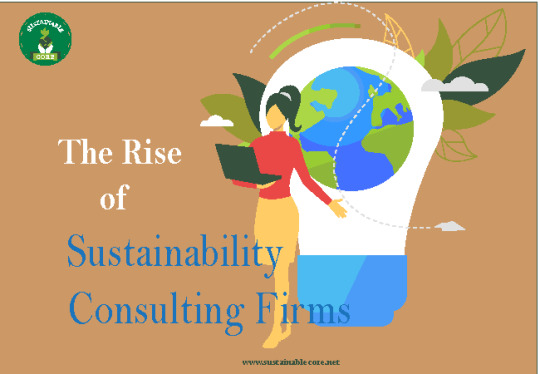#ESG Implementation
Explore tagged Tumblr posts
Text
ESG Implementation: Turning Sustainability Goals into Business Strategy

What Is ESG Implementation?
ESG implementation refers to the process of embedding environmental, social, and governance factors into a company’s decision-making, operations, reporting, and culture. It goes beyond pledges and CSR initiatives—it's about aligning core business practices with long-term sustainability.
The Three Pillars of ESG
Environmental: Focuses on resource use, emissions, waste management, energy efficiency, and climate impact.
Social: Covers labor practices, employee well-being, diversity & inclusion, community engagement, and customer responsibility.
Governance: Involves transparency, board structure, ethics, anti-corruption policies, and regulatory compliance.
Steps to Successful ESG Implementation
1. Assess Your Starting Point
Begin with an ESG gap analysis or materiality assessment. Understand your current practices, industry benchmarks, and stakeholder expectations.
2. Set Clear, Measurable Goals
Move beyond vague promises. Define SMART goals (Specific, Measurable, Achievable, Relevant, Time-bound) such as:
Reduce carbon footprint by 30% by 2030
Achieve 40% female representation in leadership by 2026
Implement anti-bribery training across all departments
3. Develop an ESG Strategy
Your ESG strategy should be integrated into your broader business plan. Assign accountability, allocate resources, and set timelines.
4. Build Cross-Functional Teams
ESG isn't just for the sustainability department. It requires collaboration across HR, finance, procurement, legal, and operations.
5. Monitor, Measure, and Report
Use recognized frameworks such as GRI, SASB, or TCFD to measure progress. Transparent reporting boosts credibility with investors and the public.
6. Engage Stakeholders
Employees, customers, and suppliers all play a role. Regularly communicate your ESG vision and progress to build trust and drive action.
7. Embed ESG into Company Culture
Train staff, revise policies, and align incentives so that ESG values are reflected in daily operations and long-term decisions.
Benefits of ESG Implementation
Enhanced reputation & brand loyalty
Attraction of ESG-conscious investors
Operational efficiency and cost savings
Regulatory compliance and risk management
Talent attraction and retention
Common Challenges
Lack of internal expertise
Difficulty in data collection and reporting
Balancing short-term costs with long-term gains
Resistance to cultural change
These challenges can be mitigated through leadership buy-in, hiring ESG consultants, and leveraging digital tools for tracking progress.
0 notes
Text
Understanding ESG: Why Environmental, Social, and Governance Matters for Every Business

In today's fast-changing business landscape, Environmental, Social, and Governance (ESG) factors have become crucial for companies striving for long-term success. ESG is more than just a trend—it's a strategic framework that helps organizations operate responsibly while building trust with stakeholders, investors, and customers.
In this blog, we’ll explore what ESG is, why it matters for every business, how it benefits organizations, and how companies can successfully integrate ESG into their operations.
What is ESG?
ESG stands for Environmental, Social, and Governance. It is a set of non-financial criteria used to evaluate how a business considers its impact on the world and its internal ethical standards.
✅ Environmental
This focuses on how a company affects the natural environment. It includes:
Energy usage and carbon emissions
Waste management
Water conservation
Sustainable sourcing
Climate change policies
✅ Social
This examines how a company manages relationships with:
Employees
Suppliers
Customers
Communities
It includes:
Labor practices
Workplace diversity and inclusion
Human rights
Consumer protection
Community engagement
✅ Governance
This relates to how a company is run. It includes:
Leadership structure
Executive compensation
Internal controls
Shareholder rights
Ethics and anti-corruption policies
Why ESG Matters for Every Business
1. Investor Expectations
Today’s investors look beyond financial performance. They want to invest in companies that are ethical, transparent, and socially responsible. ESG disclosures are becoming a key component in investor decision-making.
2. Regulatory Compliance
Governments around the world are introducing stricter ESG-related regulations. Companies that ignore ESG risk non-compliance, penalties, or loss of market access.
3. Brand Reputation
Consumers are increasingly loyal to brands that care about the environment, human rights, and corporate transparency. ESG builds brand trust and improves public image.
4. Risk Management
ESG helps identify risks early—be it environmental disasters, labor strikes, or governance scandals. Managing these proactively protects the business.
5. Long-term Profitability
Sustainable practices often lead to operational efficiencies, cost savings, and increased customer loyalty. ESG isn’t a cost—it’s an investment in the future.
Benefits of ESG Implementation
Integrating ESG principles can bring multiple benefits, such as:
Improved stakeholder trust
Better access to capital
Enhanced employee retention and productivity
Reduced operational costs
Increased innovation and market opportunities
Lower reputational and regulatory risks
Steps to Implement ESG in Your Business
If you’re considering ESG integration, follow these practical steps:
✅ Step 1: Assess Current ESG Performance
Conduct a baseline assessment of where your organization stands in terms of environmental impact, social responsibility, and governance practices.
✅ Step 2: Set Clear ESG Goals
Define measurable goals such as reducing carbon footprint, improving employee diversity, or strengthening board independence.
✅ Step 3: Develop an ESG Strategy
Integrate ESG into your business strategy. Align it with company values and stakeholder expectations.
✅ Step 4: Engage Stakeholders
Involve employees, investors, customers, and suppliers in your ESG journey. Transparency and collaboration are key.
✅ Step 5: Measure and Monitor Progress
Use ESG metrics and key performance indicators (KPIs) to track progress. Regular audits and reports help in staying accountable.
✅ Step 6: Report Transparently
Adopt global ESG reporting standards such as:
GRI (Global Reporting Initiative)
SASB (Sustainability Accounting Standards Board)
TCFD (Task Force on Climate-related Financial Disclosures)
ESG and Small Businesses: Is It Relevant?
Yes—ESG is for all businesses, regardless of size. While large corporations are often in the spotlight, small and medium enterprises (SMEs) can also gain a competitive edge through ESG by:
Enhancing customer loyalty
Attracting talent
Building strong local community relationships
Gaining supplier preference from ESG-conscious buyers
Common Challenges in ESG Adoption
While ESG is beneficial, organizations may face some hurdles:
Lack of awareness or expertise
Limited resources or budget
Difficulty in measuring non-financial impacts
Resistance to change within the organization
Partnering with ESG consultants or experts can help businesses overcome these challenges efficiently.
How 4C Consulting Can Help in ESG Implementation
With experience in implementing ESG frameworks for diverse industries, 4C Consulting offers end-to-end ESG support including:
ESG gap analysis
Strategy development
ESG training and awareness programs
ESG reporting and disclosures
ESG audits and risk assessments
Whether you're beginning your ESG journey or enhancing your existing efforts, 4C Consulting ensures compliance, transparency, and sustainable value creation.
#ESG Implementation#ESG Reporting#ESG Consultant#ESG Audit#ESG Strategy#ESG for Businesses#Environmental Social Governance#ESG Training#ESG Standards#Sustainable Business Practices
1 note
·
View note
Text
Learn how to implement ESG reporting with key frameworks like GRI, SASB, and CSRD. Ensure compliance, track KPIs, and improve sustainability efforts.
#ESG Compliance#ESG Framework#Sustainability Compliance#ESG Audit#ESG Strategy#ESG verification#Corporate ESG#Climate risk reporting#ESG data management#How to Implement ESG Reporting Step-by-Step
0 notes
Text
"The European Court of Human Rights (ECtHR) has issued a landmark ruling, declaring that failure to address environmental pollution constitutes a violation of the right to life. The court found that governments must inform citizens living in pollution-affected areas, allowing them to assess risks to their health and well-being.
The case was brought by Italian citizens affected by hazardous emissions and widespread illegal waste dumping and burning in Campania. The pollution crisis has had severe public health consequences, and the court determined that the Italian government’s failure to intervene effectively, despite the pollution being caused by private actors, breached human rights law.
The ruling is expected to set a precedent for environmental cases across Europe, reinforcing government accountability in pollution control.
ClientEarth fundamental rights lawyer Malgorzata Kwiedacz-Palosz hailed the decision as a crucial step in linking environmental protection to human rights.
“This ruling confirms that human rights depend on access to clean air, water, and soil. Governments have an obligation to shield citizens from environmental hazards, no matter their source. The court has now explicitly recognised that pollution can directly threaten the right to life, meaning states will face greater scrutiny and stricter enforcement obligations,” she said.
Leading epidemiologist Dr Fabrizio Bianchi, who submitted expert testimony, stressed the severe health risks linked to pollution in Campania, where nearly three million residents have been exposed to toxic air since the 1980s.
“The health impacts are undeniable—higher rates of cancer, cardiovascular disease, and respiratory illnesses. Authorities must implement immediate clean-up measures and long-term monitoring to protect public health,” he stated.
This ruling strengthens environmental case law within the European Court of Human Rights, setting a binding precedent for future litigation.
In a separate legal challenge in Italy, ClientEarth is supporting a mother’s case advocating for her son’s right to breathe clean air, citing Article 2 of the European Convention on Human Rights —the same provision that underpinned the ECtHR’s latest decision.
Legal experts from Torino Respira, a group supporting the case in Italy, welcomed the ruling: “This judgment reinforces our argument that failing to keep air pollution within legal limits violates a child’s fundamental right to life and health. It sets an authoritative precedent for human rights protections against environmental harm.”
With growing global recognition of environmental degradation as a human rights issue, this ruling is expected to reshape legal approaches to pollution-related cases, compelling governments to act decisively against environmental threats."
-via ESG Post, February 1, 2025
#italy#europe#pollution#air pollution#human rights#environmental news#environmental issues#good news#hope
4K notes
·
View notes
Text
The Future of Commercial Loan Brokering: Trends to Watch!
The commercial loan brokering industry is evolving rapidly, driven by technological advancements, changing market dynamics, and shifting borrower expectations. As businesses continue to seek financing solutions, brokers must stay ahead of emerging trends to remain competitive. Here are some key developments shaping the future of commercial loan brokering:
1. Rise of AI and Automation
Artificial intelligence (AI) and automation are revolutionizing loan processing. From AI-driven underwriting to automated document verification, these technologies are streamlining workflows, reducing manual effort, and speeding up loan approvals. Brokers who leverage AI-powered tools can offer faster and more efficient services.
2. Alternative Lending is Gaining Momentum
Traditional banks are no longer the only players in commercial lending. Alternative lenders, including fintech platforms and private lenders, are expanding options for businesses that may not qualify for conventional loans. As a result, brokers must build relationships with non-bank lenders to provide flexible financing solutions.
3. Data-Driven Decision Making
Big data and analytics are transforming how loans are assessed and approved. Lenders are increasingly using alternative data sources, such as cash flow analysis and digital transaction history, to evaluate creditworthiness. Brokers who understand and utilize data-driven insights can better match clients with the right lenders.
4. Regulatory Changes and Compliance Requirements
The commercial lending landscape is subject to evolving regulations. Compliance with federal and state laws is becoming more complex, requiring brokers to stay updated on industry guidelines. Implementing compliance-friendly processes will be essential for long-term success.
5. Digital Marketplaces and Online Lending Platforms
Online lending marketplaces are making it easier for businesses to compare loan offers from multiple lenders. These platforms provide transparency, efficiency, and better loan matching. Brokers who integrate digital platforms into their services can enhance customer experience and expand their reach.
6. Relationship-Based Lending Still Matters
Despite digital advancements, relationship-based lending remains crucial. Many businesses still prefer working with brokers who offer personalized service, industry expertise, and lender connections. Building trust and maintaining strong relationships with both clients and lenders will continue to be a key differentiator.
7. Increased Focus on ESG (Environmental, Social, and Governance) Lending
Sustainability-focused lending is gaining traction, with more lenders prioritizing ESG factors in their financing decisions. Brokers who understand green financing and social impact lending can tap into a growing market of businesses seeking sustainable funding options.
Final Thoughts
The commercial loan brokering industry is undergoing a transformation, with technology, alternative lending, and regulatory changes shaping the future. Brokers who embrace innovation, stay informed on market trends, and continue building strong relationships will thrive in this evolving landscape.
Are you a commercial loan broker? What trends are you seeing in the industry? Share your thoughts in the comments below!

#CommercialLoanBroker#BusinessFinancing#LoanBrokerTrends#AlternativeLending#Fintech#SmallBusinessLoans#AIinLending#DigitalLending#ESGLending#BusinessGrowth#LoanBrokerage#FinanceTrends#CommercialLending#BusinessFunding#FinancingSolutions#4o
3 notes
·
View notes
Text
by REBEKA ZELJKO
The conservative nonprofit Consumers’ Research launched a campaign on Tuesday going after investment firm Morgan Stanley Capital International (MSCI) for “embracing” in their environmental, social, and corporate governance (ESG) ratings.
The Consumers’ Research six-figure ad campaign features a new website, a national mailer, digital marketing ads and a mobile billboard outside of MSCI’s headquarters in New York City. This campaign came after a coalition of Republican attorneys general opened an investigation over allegations that MSCI had implemented anti-Israeli policies from the boycott, divestment and sanctions (BDS) movement against Israel. (RELATED: Consumers’ Research Goes After Bank of America Over ESG Policies)
“MSCI is yet another example of a massive investment firm pushing their anti-Israel agenda instead of following their fiduciary duty,” Will Hild, executive director of Consumers’ Research, told the Daily Caller News Foundation. “It’s especially appalling given the attack on the nation last October.”

(Consumers’ Research/MSCILies)
In March, the Jewish News Syndicate (JSN) reported that MSCI’s ESG policies allegedly downgraded several companies that “it said committed ‘human rights violations’ simply for conducting business in Judea and Samaria and eastern Jerusalem.” Soon after, the coalition of 18 attorneys general, led by Florida Attorney General Ashley Moody, sent MSCI’s Chairman and CEO Henry A. Fernandez a letter expressing “great concern” over the JNS report.
“In other words, it appears that MSCI is embracing the BDS movement’s false narrative of Israeli occupation and taking actions designed to pressure companies to Boycott Israel — specifically by downgrading those companies’ EGS scores if they do business in Israel,” the letter reads.”
10 notes
·
View notes
Text
Okay I keep seeing this post on Bluesky without any alt text so decided to transcribe it:
Punchbowl's @benbrodydc.bsky.social got a copy of FTC Commissioner Andrew Ferguson's pitch to be chair under Trump: [image or embed]— Justin Brookman (@justinbrookman.bsky.social) December 6, 2024 at 5:39 PM

FTC Commissioner Andrew N. Ferguson for FTC Chairman
Commissioner Ferguson is the America First, pro-innovation choice for Chairman of the Federal Trade Commission. Ferguson has impeccable legal credentials, proven loyalty to President Donald Trump, and a track record of standing up to Big Tech Censorship, DEI-wokeism, and the anti-business, anti-innovation agenda of the radical left. President Trump can designate Ferguson as Chairman of the FTC on Day 1 of the Trump Administration - no Senate confirmation is needed for sitting FTC Commissioners to become Chairman, and his term does not expire until 2030.
Major Accomplishments
Sued the Biden Administration to halt its lawless environmental, immigration and gun policies.
Directed Virginia Attorney General's efforts to bring down the Department of Homeland Security's "Disinformation Board."
Represented Virginia and numerous other States in a landmark antitrust suit against Google's ad-tech monopoly.
Successfully fought to end the Biden FTC's anti-business policy of refusing to end merger investigations early and allow firms to close their deals as soon as the FTC finds no competitive harm ("early termination").
Oversaw the effort to confirm President Trump's judicial nominations in the Senate, transforming the Supreme Court as well as the lower courts. Lead staffer for both the Kavanaugh and Barrett nominations.
Senate staff architect of President Trump's two impeachment acquittals.
Agendas for the FTC
Reverse Lina Khan's Anti-Business Agenda
Repeal burdensome regulations and provide businesses with the certainty they need. Businesses deserve to know what they can and can't do.
Support strong American companies that can beat foreign competitors. Foster innovation that improves our quality of life and makes our country greater than ever before.
Stop Lina Khan's war on mergers. Most mergers benefit Americans and promote the movement of the capital that fuels innovation. Focus FTC resources on the mergers that harm competition and hinder innovation, while permitting mergers that keep capital flowing to innovaters.
End the FTC's attempt to become an AI regulator.
No more novel and legally dubious consumer protection cases. Demand honesty and fairness to consumers, but business should not fear that the FTC will punish them for honest conduct that offends the sensibilities of bureaucrats.
Stop abusing FTC enforcement authorities as a substitute for comprehensive federal privacy legislation.
Fight the Bureaucracy to Implement President Trump's Agenda
The Constitution requires that all federal employees, even the heads of so-called independent agencies, answer to the President.
Terminate uncooperative bureaucrats.
Advance the President's agenda by taking on entrenched left-wing idealogues at the FTC who take their agenda from liberal journalists and activists. Only a strong, Trump-aligned Chairman can resist their influence.
Protect Freedom of Speech and Fight Wokeness
Investigate and proceute collusion on DEI, ESG, advertiser boycotts, etc.
End Lina Khan's politically motivated investigations.
Terminate all initiatives investigating so-called "disinformation", "hate speech" or AI "bias."
End the FTC's attacks on online anonymity.
Fight back against the trans agenda. Investigate the doctors, therapists, hospitals, and others who deceptively pushed gender confusion, puberty blockers, hormone replacement, and sex-change surgeries on children and adults while failing to disclose strong evidence that such interventions are not helpful and carry enormous risks.
Stop pursuing cases under lawless disparate impact discrimination theories. Such cases are designed to force companies to adopt de facto quotas and affirmative action policies.
Hold Big Tech Accountable and Stop Censorship
Focus antitrust enforcement against Big Tech monopolies, especially those companies engaged in unlawful censorship.
Pursue structural and behavioral legal remedies under the antitrust laws and the FTC Act to make sure large platforms treat all Americans fairly and to prevent them from using their market power to box out new entrants and stymie innovation.
Biographical Highlights
Solicitor General of Virginia
Law Clerk to Supreme Court Justice Clarence Thomas. Also clerked on D.C. Circuit, B.A. & J.D. from the University of Virginia.
Chief counsel for nominations to the Senate Judiciary Committee.
Chief Counsel to Senate Majority Leader Mitch McConnell. Ferguson served as a strong voice that supported President Trump's agenda within McConnell's office.
2 notes
·
View notes
Text
Why is ESG Intelligence Important to Companies?

Human activities burden Earth’s biosphere, but ESG criteria can ensure that industries optimize their operations to reduce their adverse impact on ecological and socio-economic integrity. Investors have utilized the related business intelligence to screen stocks of ethical enterprises. Consumers want to avoid brands that employ child labor. This post will elaborate on why ESG intelligence has become important to companies.
What is ESG Intelligence?
ESG, or environmental, social, and governance, is an investment guidance and business performance auditing approach. It assesses how a commercial organization treats its stakeholders and consumes natural resources. At its core, you will discover statistical metrics from a sustainability perspective. So, ESG data providers gather and process data for compliance ratings and reports.
Managers, investors, and government officers can understand a company’s impact on its workers, regional community, and biosphere before engaging in stock buying or business mergers. Since attracting investors and complying with regulatory guidelines is vital for modern corporations, ESG intelligence professionals have witnessed a rise in year-on-year demand.
Simultaneously, high-net-worth individuals (HNWI) and financial institutions expect a business to work toward accomplishing the United Nations’ sustainable development goals. Given these dynamics, leaders require data-driven insights to enhance their compliance ratings.
Components of ESG Intelligence
The environmental considerations rate a firm based on waste disposal, plastic reduction, carbon emissions risks, pollution control, and biodiversity preservation. Other metrics include renewable energy adoption, green technology, and water consumption.
Likewise, the social impact assessments check whether a company has an adequate diversity, equity, and inclusion (DEI) policy. Preventing workplace toxicity and eradicating child labor practices are often integral to the social reporting head of ESG services.
Corporate governance concerns discouraging bribes and similar corruptive activities. Moreover, an organization must implement solid cybersecurity measures to mitigate corporate espionage and ransomware threats. Accounting transparency matters too.
Why is ESG Intelligence Important to Companies?
Reason 1 – Risk Management
All three pillars of ESG reports, environmental, social, and governance, enable business owners to reduce their company’s exposure to the following risks.
High greenhouse (GHG) emissions will attract regulatory penalties under pollution reduction directives. Besides, a commercial project can take longer if vital resources like water become polluted. Thankfully, the environmental pillar helps companies comply with the laws governing these situations.
A toxic and discriminatory workplace environment often harms employees’ productivity, collaboration, creativity, and leadership skill development. Therefore, inefficiencies like reporting delays or emotional exhaustion can slow a project’s progress. ESG’s social metrics will mitigate the highlighted risks resulting from human behavior and multi-generational presumptions.
Insurance fraud, money laundering, tax evasion, preferential treatment, hiding conflicts of interest, and corporate espionage are the governance risks you must address as soon as possible. These problems introduce accounting inconsistencies and data theft issues. You will also receive penalties according to your regional laws if data leaks or insider trading happens.
Reason 2 – Investor Relations (IR)
Transparent disclosures can make or break the relationship between corporate leaders and investors. With the help of ESG intelligence, it becomes easier to make qualitative and manipulation-free “financial materiality” reports. Therefore, managers can successfully execute the deal negotiations with little to no resistance.
You want to retain the present investors and attract more patrons to raise funds. These resources will help you to augment your company’s expansion and market penetration. However, nourishing mutually beneficial investor relations is easier said than done.
For example, some sustainability investors will prioritize enterprises with an ESG score of above 80. Others will refuse to engage with your brand if one of the suppliers has documented records of employing child labor. Instead of being unaware of these issues, you can identify them and mitigate the associated risks using ESG intelligence and insights.
Reason 3 – Consumer Demand
Consider the following cases.
Customers wanted plastic-free product packaging, and e-commerce platforms listened to their demand. And today’s direct home deliveries contribute to public awareness of how petroleum-derived synthetic coating materials threaten the environment.
The availability of recharging facilities and rising gas prices have made electric vehicles (EVs) more attractive to consumers. Previously, the demand for EVs had existed only in the metropolitan areas. However, the EV industry expects continuous growth as electricity reaches more semi-urban and rural regions.
Businesses and investors care about consumer demand. Remember, they cannot force consumers into buying a product or service. And a healthy competitive industry has at least three players. Therefore, customers can choose which branded items they want to consume.
Consumer demand is one of the driving factors that made ESG intelligence crucial in many industries. If nobody was searching for electric vehicles on the web or everybody had demanded plastic packaging, businesses would never switch their attitudes toward the concerns discussed above.
Conclusion
Data governance has become a popular topic due to the privacy laws in the EU, the US, Brazil, and other nations. Meanwhile, child labor is still prevalent in specific developing and underdeveloped regions. Also, the climate crisis has endangered the future of agricultural occupations.
Deforestation, illiteracy, carbon emissions, identity theft, insider trading, discrimination, on-site accidents, corruption, and gender gap threaten the well-being of future generations. The world requires immediate and coordinated actions to resolve these issues.
Therefore, ESG intelligence is important to companies, consumers, investors, and governments. Properly acquiring and analyzing it is possible if these stakeholders leverage the right tools, relevant benchmarks, and expert data partners.
2 notes
·
View notes
Text
Best 10 Business Strategies for year 2024
In 2024 and beyond, businesses will have to change with the times and adjust their approach based on new and existing market realities. The following are the best 10 business approach that will help companies to prosper in coming year
1. Embrace Sustainability
The days when sustainability was discretionary are long gone. Businesses need to incorporate environmental, social and governance (ESG) values into their business practices. In the same vein, brands can improve brand identity and appeal to environmental advocates by using renewable forms of energy or minimizing their carbon footprints.
Example: a fashion brand can rethink the materials to use organic cotton and recycled for their clothing lines. They can also run a take-back scheme, allowing customers to return old clothes for recycling (not only reducing waste but creating and supporting the circular economy).
2. Leverage AI

AI is revolutionizing business operations. Using AI-fuelled solutions means that you can automate processes, bring in positive customer experiences, and get insights. AI chatbots: AI can be utilized in the form of a conversational entity to support and perform backend operations, as well.
With a bit more specificity, say for example that an AI-powered recommendation engine recommends products to customers based on their browsing history and purchase patterns (as the use case of retail). This helps to increase the sales and improve the shopping experience.
3. Prioritize Cybersecurity
Cybersecurity is of utmost important as more and more business transitions towards digital platforms. Businesses need to part with a more substantial amount of money on advanced protective measures so that they can keep sensitive data private and continue earning consumer trust. Regular security audits and training of employees can reduce these risks.
Example: A financial services firm may implement multi-factor authentication (MFA) for all online transactions, regularly control access to Internet-facing administrative interfaces and service ports as well as the encryption protocols to secure client data from cyberattacks.
4. Optimizing Remote and Hybrid Working Models

Remote / hybrid is the new normal Remote teams force companies to implement effective motivation and management strategies. Collaboration tools and a balanced virtual culture can improve productivity and employee satisfaction.
- Illustration: a Tech company using Asana / Trello etc. for pm to keep remote teams from falling out of balance. They can also organise weekly team-building activities to keep a strong team spirit.
5. Focus on Customer Experience
Retention and growth of the sales follow-through can be tied to high quality customer experiences. Harness data analytics to deepen customer insights and personalize product offers making your marketing campaigns personal: a customer support that is responsive enough can drive a great level of returning customers.
Example – For any e-commerce business, you can take user experience feedback tools to know about how your customers are getting along and make necessary changes. Custom email campaigns and loyalty programs can also be positively associated with customer satisfaction and retention.
6. Digitalization Investment

It is only the beginning of digital transformation which we all know, is key to global competitiveness. For streamlining, companies have to adopt the use advanced technologies such as Blockchain Technology and Internet of Things (IoT) in conjunction with cloud computing.
IoT example : real-time tracking and analytics to optimize supply chain management
7. Enhance Employee Skills
Develop Your Employees: Investing in employee development is key to succeeding as a business. The training is provided for the folks of various industries and so employees can increase their skills that are needed to work in a certain company. Employee performance can be enhanced by providing training programs in future technology skills and soft skills and job satisfaction.
Example: A marketing agency can host webinars or create courses to teach people the latest digital marketing trends and tools This can help to keep employees in the know which results in boosting their skills, making your campaigns successful.
8. Diversify Supply Chains

The ongoing pandemic has exposed the weaknesses of global supply chains. …diversify its supply base and promote the manufacturing of drugs in Nigeria to eliminate total dependence on a single source. In return, this approach increases resilience and reduces exposure to the risks of supply chain interruption.
- E.g., a consumer electronics company can source components from many suppliers in various regions. In so doing, this alleviates avoidable supply chain interruptions during times of political tensions or when disasters hit.
9. Make Decisions Based on Data
A business database is an asset for businesses. By implementing data, they allow you to make decisions based on the data that your analytics tools are providing. For example, sales analysis lets you track trends and better tailor your goods to the market.
Example: A retail chain can use data analytics to find out when a customer buys, and it change their purchasing policies. This can also reduce overstock and stockouts while overall, increasing efficiency.
10. Foster Innovation

Business Growth Innovation is Key A culture of creativity and experimentation should be established in companies. Funding R&D and teaming with startups can open many doors to both solve problems creatively but also tap into new markets.
Example: A software development firm could create an innovation lab where team members are freed to work on speculative projects. Moreover, work with start-ups on new technologies and solutions.
By adopting these strategies, businesses can navigate the turbulence for 2024 and roll up market — progressive.AI with an evolving dynamic market, being ahead of trends and updated is most likely will help you thrive in the business landscape.
#ai#business#business strategy#business growth#startup#fintech#technology#tech#innovation#ai in business
2 notes
·
View notes
Text
Over the past week, airplanes made by Boeing have been involved in numerous incidents, including midair emergencies, leaking hydraulic fluid, a wheel falling off a plane as it took off, pilots losing control of the plane mid-journey, and a plane plummeting suddenly and injuring 50 people. As a result, right-wing influencers and far-right extremists are once again spreading the conspiracy that Boeing’s problems are all due to the airplane manufacturer's supposed embrace of diversity.
But this time around, they are going even further: Some are even claiming that the accidents are happening intentionally, and that Boeing is failing on purpose as part of a global conspiracy to bring down Western civilization and promote communism and countries like China.
These claims began earlier this year after a part of a Boeing-built Alaska Airlines plane blew off during a flight. Far-right figures claimed that airlines were now more dangerous, not because of faults with the production process, but because they forced diversity, equality, and inclusion (DEI) policies which, conspiracists claimed without any proof, resulted in putting unqualified flight crews in the cockpit. The same far-right figures are now claiming that Boeing’s support of environmental, social, and governance (ESG) policies and DEI have led to plummeting standards in the manufacturing process.
“Boeing … could be deliberately committing suicide as an organization,” James Lindsay, an anti-LGBTQ extremist who spreads conspiracy theories about communism taking over the world, said on the Joe Rogan Experience podcast released on Thursday. “It’s cutting corners, it’s locked in by this ESG/DEI stuff.”
“Isn’t United run by a drag queen?” Rogan asked on the podcast.
Lindsay went on to explain that a new Chinese plane called the Comac C919, which is virtually identical to the Boeing 737, was posed to be introduced as a replacement for the US-made plane. “So maybe you kill Boeing and you allow American manufacturing of high-quality aircraft to fall, and then the Chinese competitor is now the thing on the market that doesn't have this bad rap sheet and this risk factor, maybe it's big dirty international business that's actually happening,” Lindsay said.
The conspiracist also claimed, without proof, that executives at Boeing were allowing these accidents to happen in order to increase their own bonuses, awarded for implementing ESG policies.
On his own podcast on Thursday night, Donald Trump Jr. claimed that Boeing’s apparent demise as a result of diversity was a symbol of a broader collapse of Western civilization.
“This is American decline,” Trump Jr. said. “This is happening across our country. This is because of ridiculous policies, stupidity, DEI, and everything. This is what's happening to America in a broad-spectrum way.”
Boeing said that it was gathering more information about the incidents that took place over the past week, and has also repeatedly said that it was working to cooperate with a Department of Justice criminal investigation into the Alaska Airlines blowout. Additionally, the company’s latest diversity report, covering 2020 to 2022, shows that the company has not yet met the DEI goals it set for itself in relation to hiring women and Black people.
But this hasn’t stopped the Boeing conspiracy from being spread and celebrated by the wider right-wing community online.
On X (formerly Twitter), far-right radio host Glenn Beck posted a video of the C919 plane, with the comment “When [Boeing] goes down due to DEI, look who is waiting with the wings. CHINA.”
“Boeing is essentially sabotaging its own operations, similar to the chaotic retreat from Afghanistan orchestrated by President Biden, which allowed China to fill the void left by America,” Michael O’Fallon, a founder of a corporate travel agency, wrote on X in a post shared by both Lindsay and Beck.
It’s not just public figures spreading these conspiracies, either—the baseless allegations have filtered into all corners of the internet, including far-right message boards, Telegram channels, and X. “Commercial Airlines and Boeing should have never been brainwashed by the WOKE radicals into DEI training & hiring where diversity was prioritized over merit with no regard for passenger safety,” a right-wing account on X wrote this week.
On Telegram, a similar narrative was shared, including claims that this entire series of accidents was an effort to stop Americans from flying.
“I am under the impression that this whole DEI program is a way to self-sabotage the entire airline industry, which will in turn scare the hell out of people from flying,” John Sabal, a QAnon influencer, wrote on his Telegram channel. Sabal baselessly linked the accidents to a global plot to undermine Western democracies. “Notably, UN Agenda 2030 places quite a few restrictions on flying for the general population,” he said, “As if the Globalists do not want you traveling. It’s far past time to start asking some serious questions.”
6 notes
·
View notes
Text
Implementing ESG: A Strategic Path to Sustainable Success
The ESG Pillars and Their Impact
Environmental Responsibility At its core, the "E" in ESG emphasizes reducing environmental impact through energy efficiency, waste management, and sustainable sourcing. For businesses, implementing green practices isn’t only about minimizing carbon footprints but also about meeting regulatory compliance and enhancing operational efficiency. These actions resonate with eco-conscious consumers, attract investors focused on sustainability, and reduce long-term operational risks.
Social Engagement The “S” in ESG focuses on the people—employees, communities, and society at large. Businesses that prioritize social responsibility cultivate a positive corporate culture, promote diversity and inclusion, and uphold ethical practices. This includes providing safe working conditions, supporting local communities, and ensuring a fair supply chain. Strong social commitments boost employee morale, foster customer loyalty, and contribute to a company’s positive reputation in the public eye.
Governance for Accountability Governance, the "G" in ESG, refers to the internal practices that guide corporate decision-making, transparency, and accountability. Sound governance ensures compliance with regulations, ethical business practices, and the protection of shareholders’ rights. Governance practices may include transparent reporting, independent board oversight, and executive accountability. This element strengthens trust among stakeholders and reinforces a business’s commitment to integrity.
Key Steps for Effective ESG Implementation
Assess and Define ESG Goals Begin with a thorough assessment of the organization’s current ESG status, understanding the impact areas, and identifying key ESG goals. This could involve stakeholder interviews, reviewing company policies, and setting benchmarks based on industry standards. Defining clear, actionable, and measurable ESG objectives enables a focused strategy tailored to the company’s values and operational context.
Integrate ESG into Business Strategy ESG should be woven into the fabric of the company’s core strategy, not treated as an isolated initiative. Departments across the organization—from HR to finance and operations—must collaborate to align their practices with ESG goals. For example, finance teams can work on sustainable investment strategies, while HR can focus on diversity initiatives. Cross-functional alignment is essential for a cohesive and effective ESG strategy.
Set KPIs and Track Progress Implementing ESG without measurable goals can lead to a lack of accountability and progress. Key performance indicators (KPIs) specific to each ESG pillar allow organizations to track their achievements, adjust strategies as needed, and share transparent progress with stakeholders. Metrics might include energy consumption reductions, community impact assessments, and diversity ratios, with regular reports to stakeholders.
Engage Stakeholders and Communicate Efforts Transparency is crucial for successful ESG implementation. Regular communication with stakeholders, including employees, investors, customers, and the community, fosters trust and shows commitment. Sharing ESG progress in annual reports, newsletters, and public statements demonstrates the organization’s dedication and can inspire stakeholder support and buy-in.
Adapt and Evolve with Emerging Standards ESG standards and expectations continue to evolve as new environmental issues and social priorities emerge. Staying updated on industry-specific regulations and sustainability advancements allows organizations to adapt their ESG strategies, ensuring continuous improvement and relevance.
The Benefits of ESG Implementation
By embedding ESG principles into their operations, organizations can enjoy benefits beyond compliance. ESG-focused companies often see improved financial performance, brand reputation, employee engagement, and risk management. With investors increasingly prioritizing ESG considerations, businesses that demonstrate commitment to these principles attract funding and partnerships geared toward responsible growth. Moreover, companies with solid ESG practices are better equipped to adapt to challenges, building resilience in a rapidly changing market.
A Sustainable Future through ESG
ESG implementation is a long-term commitment that aligns business success with societal and environmental well-being. As organizations across industries adopt ESG strategies, they not only secure their own growth but also contribute to a sustainable and equitable future for all. By taking responsible actions today, companies are setting the stage for a future where profit, people, and the planet prosper together.
0 notes
Text

#Amreading #Newrelease2024: Prosperity Bonds Agency - Call to Action to G7 by HUSEYIN BURAK ERTEN
Discover the Power of Prosperity Bonds: A Call to Action for the G7
Unlock the potential of innovative financial solutions with "Prosperity Bonds Agency-A Call to Action to G7." This groundbreaking book explores the urgent need for global collaboration to implement prosperity bonds and address the world's most pressing challenges.
In a world where rapid change aligns with the evolving dynamics of geopolitics and our ways of life, H. Burak Erten embarked on a journey to find practical solutions for efficient capital deployment in developed and developing markets. Inspired by Dell Computers' 'Plug and Play' concept, Erten proposes a financial architecture that integrates components already recognized by global capital markets.
The principle of "Share the Risk, Share the Prosperity" promotes the fair and meaningful deployment of resources. Erten's vision is to bridge the gap between developed and emerging markets, fostering a world built on shared values of fairness, equity, respect, inclusivity, and diversity. The proposed G7 bond issuance agency would facilitate low-cost, long-term bond issuances based on the inherent credit ratings of participating nations, leveraging the notion of governments acting as catalysts to mobilize private capital.
Drawing from several capital market structures in the USA and EU, Erten offers numerous benefits for investors through this bond architecture. The strategy relies on risk syndication, ensuring each project is structured as listed bonds in the EU, promoting good corporate governance, transparency, institutionalism, and accountability.
This non-concessionary, profit-oriented entity is designed to prevent wealth transfer from one nation to another, with safeguards to protect G7 taxpayers from defaulted projects. The agency addresses global issues such as economic stimulus, job creation, refugee movements, poverty alleviation, and increased investments in ESG-impact investing.
The book also provides real-world examples and case studies that illustrate the transformative impact of prosperity bonds on developed and emerging markets. It compares prosperity bonds with other initiatives, such as China's Belt and Road and the EU's Global Gateway, highlighting their advantages.
Gain insights into practical steps and strategies for deploying prosperity bonds, from governance structures to risk syndication and stakeholder engagement. Be inspired by a compelling vision for a more equitable and sustainable world, and find out how you can be part of this global movement.
Erten's model is applicable and replicable for many initiatives launched with participating members from other organizations, regional or global. This financial architecture can unlock capital in many other ways with participants of differing natures.
Join the Call to Action movement towards a more prosperous and sustainable world with "Prosperity Bonds Agency - A Call to Action to G7.
Order YOUR Copy NOW: https://amzn.to/4bqhVHY via @amazon
3 notes
·
View notes
Text

The Rise of Sustainability Consulting Firms
Sustainability consulting firms are specialized organizations that provide comprehensive guidance and strategic advice to businesses seeking to incorporate sustainable practices into their operations. These firms work closely with clients to develop tailored sustainability strategies, identify areas for improvement, and implement effective solutions that align with environmental, social, and governance (ESG) goals.
#sustainability#sustainable living#sustainable#ecoconscious#sustainability consulting#business consulting
2 notes
·
View notes
Text
C40 Cities is a global network of the mayors of the world’s leading cities united in confronting climate change. There are 96 member cities, including 14 in the United States. These 96 cities account for more than 20% of the global economy. The mayors of these cities plan to pass laws and offer incentives to have their plans accepted and implemented…
10 notes
·
View notes
Text
PMO-Beratung

Website: https://www.pureconsultant.de/de/beratung/project-management-office-beratung/
Address: Hohenstaufenring 57a, 50674 Köln, Germany
Pure Consultant bietet professionelle PMO-Beratungsdienstleistungen an. Unser erfahrenes Team von PMO-Beratern steht Ihnen zur Seite, um maßgeschneiderte Lösungen zu entwickeln und eine effektive PMO-Transformation in Ihrem Unternehmen zu ermöglichen. Wir bringen umfassende Expertise im Bereich PMO Consulting ein, um individuelle Strategien zu entwerfen und die Effizienz Ihres Projektmanagements zu steigern. Unsere Fokussierung liegt darauf, Ihre Organisation durch effektive Schulungen und praxisnahe Anleitung auf dem Weg zu einem effizienten PMO zu begleiten.
Provenexpert: https://www.provenexpert.com/pcg-pure-consultant-gmbh/
Xing: https://www.xing.com/pages/pcgpureconsultantgmbh
Trustpilot: https://de.trustpilot.com/review/pureconsultant.de
Linkedin: https://www.linkedin.com/organization-guest/company/pcgpureconsultantgmbh
Keywords:
pmo beratung
pmo consultant
pmo consulting services
pmo consulting firms
pmo consulting companies
project management office consultant
platinum pmo consulting
atkins pmo consultant
consulting
business consultant
power bi consultant
it consulting
salesforce consultant
hr consulting
marketing consultant
hr consulting firms
seo consultant
consulting firms
sharepoint consultant
management consulting
netsuite consultant
strategy consulting
business consulting services
healthcare consulting
salesforce implementation partner
business consultant near me
accenture consulting
route consultant
small business consultant
cyber security consultant
sustainability consultant
franchise consultant
consulting services
digital transformation consultant
ai consultant
wealth management consultant
consulting company
google analytics consultant
mba consulting
digital marketing consultant
restaurant consultant
healthcare consulting firms
hr consulting services
human resources consultant
devops consulting
small business consulting services
environmental consultant
business plan consultant
technology consultant
salesforce consulting companies
sap consulting
bain and company
supply chain consultant
brand consultant
tech consulting
financial consulting
software consultant
ey consulting
hr consulting companies
dei consultant
starting a consulting business
data science consulting
product management consulting
business development consultant
project management consultant
safety consultant
software consulting companies
change management consultant
management consulting firms
esg consulting firms
2 notes
·
View notes
Text
By: Claire Lehmann
Published: Jul 7, 2023
In medieval times, it was common practice for the wealthy to buy indulgences from the church to atone for their sins. These payments, the church assured, meant the person paying would not remain in purgatory for too long and would later ascend into heaven.
A wealthy person could even buy indulgences for their family members or ancestors who were long dead. Today we think of ourselves as far more enlightened than our medieval forebears. We secular folk would never pay a class of clerics large sums of money to atone for our sins. Or would we?
In recent years, billions of dollars have flowed into investment funds that market themselves as providing “environmental, social and governance” impacts. In Australia, industry super funds lead this trend, with money pouring into funds that then invest in companies that promote green, social justice, equity, diversity and inclusion causes.
The basic idea behind ESG, which has been promoted by organisations such as the World Economic Forum, is that one can make a profit and “do good” at the same time. Investors argue they can contribute to a net-zero future while making solid returns, or contribute to social justice alongside their fiduciary duty.
Rating agencies and research firms issue ESG “scores” to companies that are then used by bodies who advise institutional and retail investors which organisations they should invest in. Because ESG has no standardised metrics or even standardised definitions, such scores can be massaged by those companies that have enough money to play the game.
An entire industry of consulting agencies and non-profits exists today to implement cosmetic changes within companies to boost their ESG scores. Such cosmetic changes may include sponsoring a float at the Gay and Lesbian Mardi Gras or offering paid leave for staff who wish to change their gender.
As I commented in these pages last year, “gender affirmation leave” is offered by our two biggest supermarkets, Coles and Woolworths, and contributes to these companies earning “gold- and platinum-tier” status by the Australian Workplace Equality Index – despite the fact both companies are simultaneously implicated in wage theft scandals.
Sometimes called “wokewashing”, the practice of buying virtue through ESG allows corporate entities to deflect attention away from their PR embarrassments, like Henry VIII’s Indulgences allowed him to go on indulging.
Such practices are called wokewashing because these changes usually do not go deep enough to really cause change within a large organisation. By sheer virtue of their size, our largest corporations often make mistakes that only a complete overhaul of management practices could possibly address.
Take BHP, for example. The biggest company in Australia, and largest mining company in the world, is now embroiled in one of the biggest wage theft scandals in history. Accused of underpaying 28,500 workers $430m in wages for deducting public holidays from leave entitlements, BHP is now supporting the Yes vote in the voice referendum and has pledged a $2m donation to the campaign. This pledge is likely to boost its ESG score, but whether it satisfies the workers who have been underpaid is yet to be seen.
It is not just the mining industry that seeks ESG redemption. The banking industry wants to buy its way into heaven as well. Following on the heels of the disastrous royal commission into the sector, the Big Four are all doubling down on ESG. NAB faced criminal charges in 2021 for failing to pay casual employees long-service leave entitlements, but this is offset by its sponsorship of Midsumma – Melbourne’s queer arts and cultural festival. Last year ANZ was fined $25m for misleading consumer practices, but it also announced it was offering its staff paid leave for a sex change.
Commonwealth Bank has been in hot water in recent years for breaching money-laundering laws and Westpac was required to pay a $1.3bn fine after 250 customers made transfers that were linked to child exploitation. Both organisations are atoning for these sins by campaigning for the Yes vote.
Almost every large corporation that has signed on to the Yes campaign for the voice referendum is embroiled in some kind of scandal that involves their core business. Whether Coles is underpaying its staff, or Rio Tinto is dealing with dozens of accusations of sexual harassment, each company has significant work to do internally.
And this is why ESG is so popular among our corporate class. Symbolic gestures that can be outsourced to consultants and NGOs are an easy box-ticking exercise. Systemic changes to management habits, or making sure business practices are fair, is much more costly and time-consuming than simply waving a rainbow flag.
In the medieval period, wealthy elites would pay indulgences in order to curry favour with the church because the institution was incredibly powerful.
It is not surprising then that our biggest corporations are pledging their support for ESG goals that are also supported by the government, unions, the majority of our media, academia and non-profit sectors.
While commitment to ESG is not necessarily a sign of true moral fibre, if it can assist in washing away the stain of sin, then every dollar pledged will be money well spent.
==
Whenever a large corporation pledges its commitment to some movement or ideology, especially those that are unrelated to their actual business, you should assume that it's hiding something.
The more controversial the movement or ideology, the bigger the scandal they're trying to distract attention from.
For reference, the "Voice to Parliament" is a referendum to embed in the Australian constitution a vaguely defined independent body with unknown powers, unclear authority and unidentified influence to be a whisper in the ear of the Australian political system, supposedly representing all indigenous (Aboriginal) Australians. In essence, it functions as a form of "reparations."
When it's rejected, as current polling indicates it massively will be, as with Affirmative Action, citizens will be scolded by the supporters for their "racism," and the country will be told it's irredeemably racist. Rather than recognizing the diverse objections to the initiative: the lack of transparency of what the body is or does; progressives who insist it doesn't go far enough (e.g. a desire to literally "hand back" the land); Aboriginal Australians themselves who are concerned about establishing a "separate but equal" system; importing Critical Race Theory ideas from the US to racially divide the nation; the rather racist notion itself that any single "voice" could represent all indigenous people, ignoring that their viewpoints are as diverse as everyone else's; and the very simple answer of "I don't like this particular solution."
But while all of that is going on, the companies will be looking for their next diversion.
#Claire Lehmann#wokewashing#woke washing#voice referendum#voice to parliament#referendum#wokescreen#indigenous voice to parliament
6 notes
·
View notes